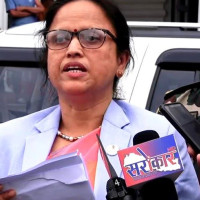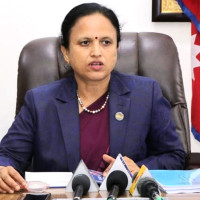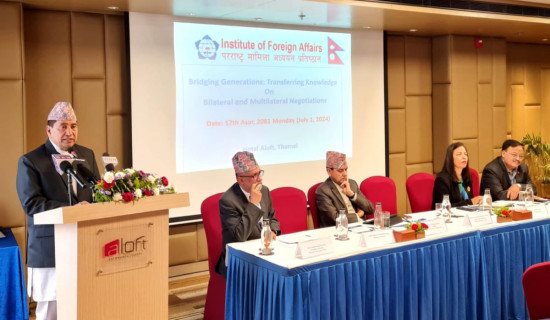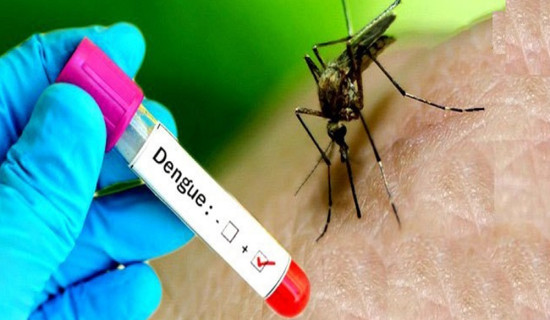- Tuesday, 2 July 2024
Climate-friendly tech will be applied in agriculture: PM
By A Staff Reporter,Kathmandu, June 30: Farmers across the country marked the 21st National Paddy Day and Paddy Plantation Festival by planting paddy and savouring Dahi Chiura (curd and beaten rice) on Saturday.
The theme of the 21st National Paddy Day is ‘Climate resilient farming, increase in paddy production”.
Nepal started celebrating Asar 15 as National Paddy Day from 2005 as per a minister-level decision taken on December 14, 2004. The Day is marked on the 15th day of the month of Asar every year.
The paddy festival is celebrated in different ways depending on the part of the country. Singing, dancing, playing with mud and enjoying good food like curd and beaten rice are a part of it.
Asar is popularly known as ‘mano ropera muri ubjaune’ (Growing a lot by sowing little) time.
A central-level formal programme was organised at Sauraha (Bachhauli) in Chitwan to mark the day in the presence of Prime Minister Pushpa Kamal Dahal ‘Prachanda’.
On the occasion, Prime Minister Prachanda has planted paddy using paddy transplanter, a modern agricultural input where government officials, farmers and paddy experts and others in attendance.
Addressing the programme, Prime Minister Prachanda has said that the government's priority was research, development and dissemination of climate-friendly technology to increase the production and productivity of rice.
Prime Minister Dahal clarified that research, development and dissemination of climate-friendly technologies to reduce the negative impact of climate change on major crops, including rice and increase production and productivity, was the government's priority.
"Production will be increased by using climate-friendly agricultural inputs in paddy crops," Prime Minister Prachanda added.
"The government is going to increase the use of technology to raise the production and productivity of rice with the belief that production can be increased by adopting climate-friendly technologies and substitute the import of paddy and rice.”
"We have adopted a strategy to increase the production of paddy through the use of biological diversity and the development of high-yielding rice varieties with high nutritional value, and the use of farmer-friendly technologies in production," he said. "In order to achieve prosperity in the country through the commercialisation and diversification of the agricultural sector, climate change has recently emerged as a major challenge vis-à-vis this sector.”
Prime Minister Prachanda said that even though Nepal had a minor role in green gas emissions, Nepal was also among the countries that were at high risk of the adverse effects of climate change.
"Among the sensitive and affected sub-sectors in terms of climate change, the main food crop of Nepal is paddy. We need to utilise varieties adapted to the negative effects of drought, unseasonal rains, floods and landslides, sudden diseases and insect outbreaks, increase in temperature, and technologies to increase production,” he said.
Prime Minister Prachanda
said that it was necessary to increase the production of rice and substitute the import to become self-reliant in rice.
"In order to be self-reliant in rice in the country, we must be active with a special plan for increasing production and productivity," he said.
The Prime Minister called upon all the three levels of government for the successful implementation of the policies taken by the government of Nepal for increasing agricultural produce, including paddy.
He clarified that in order to reduce dependence and trade imbalance and increase rice production at the national level, the present government has given priority to the availability of chemical fertilisers and quality seeds, technology expansion, research and development and the implementation of minimum support price.
He said that there is an international commitment to achieve sustainable development goals and a national commitment to improve the situation of food nutrition security through the implementation of the agricultural development strategy.
He said, "I believe that everyone will continue to make a solid contribution to building a prosperous economy through the production and productivity of rice crops."
On the occasion, Minister for Agriculture and Livestock Development Jwala Kumari Sah, expressed the commitment of the government to work for the production and marketing of agricultural products by emphasising the production of agricultural produce.
"The team of the Ministry of Agriculture is working round the clock for the development of the agricultural sector.
The Ministry has advanced the work in terms of mechanisation and commercialisation in agriculture reflecting the sense of unity," she said.
The government has been operating the super zone and zone with the objective of mechanising, commercialising and marketing agriculture.
Bagmati Province Chief Minister Shalikram Jamkattel said that Chitwan would be made a model district for rice production by preparing 22 plots.
He said that Chitwan would be developed as a pocket area from the point of view of seed production, and informed that the province government was preparing to announce one ward, one pocket area. He said that Chitwan would be made self-reliant in terms of paddy production within five years.
Member of the House of Representatives Hari Dhakal, Director General of Department of Agriculture Narahari Prasad Ghimire, and Chief of Ratnanagar Municipality Prahlad Sapkota emphasised on the production of paddy, the staple grain of the country.
Meanwhile, Prime Minister Prachanda also participated in the Paddy Planting Festival organsied by Bharatpur Metropolitan City at Kesharbag in West Chitwan.
On the occasion, he said that the government is trying to make the country self-reliant not only in paddy but also in other food items.
Stating that the government had announced the Agriculture Decade Programme in the budget and policies and programmes of the next fiscal year, the Prime Minister expressed his belief that the country can become self-reliant in rice by ensuring irrigation, providing seeds and fertilisers and mechanisation. Mayor of Bharatpur Metropolitan City Renu Dahal assured that arrangements will be made to provide irrigation to all the arable lands of Chitwan throughout the year.
Stating that the productivity would be increased by implementing farmer-friendly programmes, she said that efforts were being made to make Chitwan self-sufficient in food.
(With inputs from Basanta Parajuli and Shanta Adhikari)









-original-thumb.jpg)





